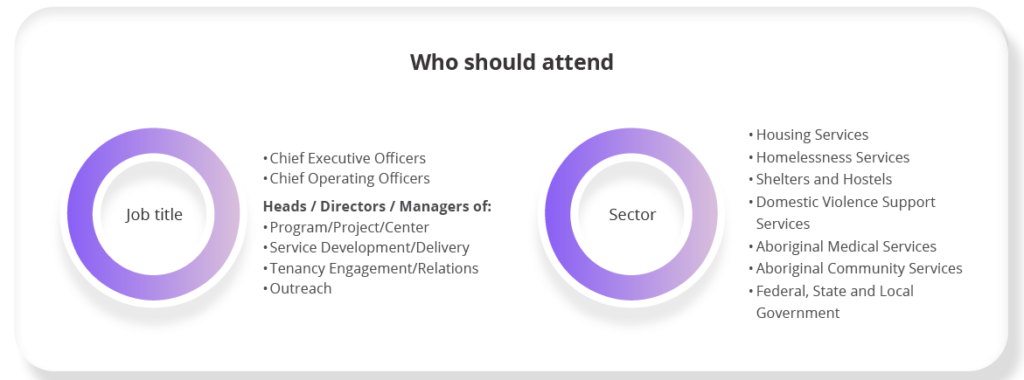
Breaking the cycle of homelessness through intervention, collaboration and culturally appropriate housing
27 - 29 April 2022 | Hilton Darwin
OVERVIEW
On any given night one in 200 people are homeless in Australia and the number is growing at a rate of 13%.
Homelessness cannot be solved by just providing a roof over their heads. Homelessness ties in with many factors and it intersects with mental health, family violence, the justice system, ineffective social policy and housing affordability. The pandemic has added more complexities to the existing set of challenges.
Third Sector’s 4th Annual National Housing and Homelessness Forum will provide attendees with the opportunity to acquire knowledge on how to effectively deliver services that are culturally inclusive and appropriate, implement strategies to build pathways out of homelessness, identify the importance of housing systems resilience to shocks (e.g. COVID-19, natural disasters etc.) and develop an action plan for services to implement an early intervention and prevention approach.
ATTEND THIS FORUM AND LEARN HOW TO:
Develop effective prevention and early intervention models for homelessness
Implement a blueprint for culturally inclusive and appropriate services
Support Aboriginal and Torres Strait Islander people experiencing homelessness
Provide mentoring and pathways out of homelessness
Develop collaborative cross-sector partnerships between government, communities and community organisation

150+
ATTENDEES

25+
SPEAKERS

2
DEDICATED STREAMS
WHAT OUR CLIENTS SAY
AGENDA
8:00 AM
Registration opens
8:30 AM
Welcome to Country
Aunty Bilawara Lee, Larrakia Elder
8:50 AM
Opening remarks from the Chair
Karen Walsh, Chief Executive Officer, Venture Housing
9:00 AM
Opening Keynote
How to provide Indigenous people with housing that is affordable, stable, secure and for the long-term
• Implementing policies that incentivise Indigenous people towards home ownership
• Focusing on the need to provide more services that cater specifically to Aboriginal and Torres Strait Islander people at risk of being homeless
• Analysing the housing and homelessness initiatives and reform that are underway in both urban and remote settings
Hon Kate Worden, Minister for Territory Families and Urban Housing, Legislative Assembly of the Northern Territory
9:30 AM
Panel Discussion
How to overcome the existing set of challenges faced by Aboriginal and Torres Strait Islander people experiencing homelessness
• How to provide Indigenous people with housing that is affordable, stable, secure and for the long-term
• Implementing policies that incentivise Indigenous people towards home ownership
• Focusing on the need to provide more services that cater specifically to Aboriginal and Torres Strait Islander people at risk of being homeless
Moderator
Karen Walsh, Chief Executive Officer, Venture Housing
Panelists
Suzanne Naden, Chief Executive Officer, Bungree Aboriginal Association
Shaun Middlebrook, Manager – Strategic Policy, Advocacy and Communications, Aboriginal Housing Victoria
Alan Mole, Deputy Chief Executive Officer, Kalano Community Association
10:10 AM
Two Years On – Prospects for Housing the Territory’s Homeless
• Recapping what has happened in the NT since the 2019 National Housing and Homelessness Forum in Darwin
• Learning the lessons from COVID-19, impacts on regional rental markets, and implications for homelessness
• Building better arguments to address homelessness – housing’s role as key infrastructure
Peter McMillan, Chief Executive Officer, NT Shelter
10:40 AM
Morning Refreshments
Stream A: Developing effective prevention and early intervention models
Chair: Gerry Georgatos, Founder, Georgatos Foundation
Stream B: Implementing strategies to strengthen the housing industry
Chair: Karyn Walsh, Chief Executive Officer, Venture Housing
11:10 AM
Case study
Developing effective early intervention and prevention models to reduce homelessness
• Identifying the different types of interventions to deal with the complex causes of homelessness
• Creating pathways for vulnerable groups and providing secured housing
• How to prioritise crisis situations to ensure support is available at the time of need
Leanne Strommen, General Manager, Centrecare Incorporated
Case study
Affordable housing isn’t cheap!
Addressing housing and homelessness through a physical design lens
• Analysing the trends in severe overcrowded dwellings as a bi-product of homelessness
• Identifying the role ‘good’ dwelling design plays in early intervention, meaningful collaboration and culturally appropriate housing
• Introduction of the “All A’s assessment framework”: affordable, accessible, adaptable, appropriate, with agency and amenity
John Engeler, Chief Executive Officer, Shelter NSW
11:40 AM
How to provide suitable accommodation for Youth to ensure their wellbeing
•Developing strategies for disadvantaged youth to get access to housing that is appropriate
•Ensuring that young people have equal opportunity and are supported through the process
•Delivering housing solutions for young people ensuring connection to culture and community
Ojisi Charlie, Chief Executive Officer, Alice Springs Youth Accommodation and Support Services
Creating a healthy housing model that combats the Indigenous overcrowding issue
• Identifying a mid-point for Indigenous culture and housing to deliver programs for overcrowding
• How can services deliver solutions to combat the growing issue of overcrowding
• Identifying the impact of overcrowding on mental health and wellbeing
Alisi Tutuila, Chairperson, Aboriginal Housing Company Limited
*Virtual Presentation
12:10 PM
How to implement prevention and early intervention strategies for Indigenous Australian’s facing homelessness
• How to identify Indigenous people at risk of homelessness
• Developing services that are culturally appropriate and inclusive for Indigenous people
• How to create a service that gains the trust of the Indigenous community
Shaun Middlebrook, Manager – Strategic Policy, Advocacy and Communications, Aboriginal Housing Victoria
Panel Discussion
Examining the effects of the pandemic and its impact on housing
• Identifying the reasons for the increased rate of homelessness during the pandemic
• How the lockdowns resulted in longer waiting times for housing
• Building strategies to build resilience and prepare for post-pandemic adaptations
Moderator:
Karyn Walsh, Chief Executive Officer, Venture Housing
Panelists:
Jennifer Smith, Chief Executive Officer, Residential Tenancies Authority
David Fisher, Chief Executive Officer, Housing Plus *Virtual Panelist
Paul Tommasini, Chief Executive Officer, InCommunity Inc | Tenancy Skills Institute
Ojisi Charlie, Chief Executive Officer, Alice Springs Youth Accommodation and Support Services
12:40 PM
Networking Luncheon
1:40 PM
Case study
Developing strategies to combat the growing number of older people facing homelessness
• Developing prevention and early intervention models to stop elderly people from entering homelessness
• Implementing strategies to support older women and keep them safe
• How to provide appropriate and affordable housing for older people
Suzanne Naden, Chief Executive Officer, Bungree Aboriginal Association
How to provide support for people with complex needs who are experiencing or at risk of homelessness
• Identifying and addressing different types of challenging behaviours to support people with complex needs
• How to provide appropriate housing services and support for people with complex needs
• Advancing service delivery through an improved understanding on the impact of complex needs on homelessness
Dr Andrew Davies, Chief Executive Officer, Homeless Healthcare
2:10 PM
Panel Discussion
How to develop an effective outreach service model to aid early intervention
• How to implement an outreach program to educate and raise awareness of services available for people experiencing homelessness
• Developing models to increase access to services in remote and rural areas
• Creating an outreach service that is accessible, available and trusted
Moderator:
Gerry Georgatos, Founder, Georgatos Foundation
Panelists:
Bob Jordan, Chief Executive Officer, The Housing Agency (Ireland) *Virtual Panelist
Simon Newport, Acting Chief Executive, Aboriginal Housing Office – NSW Department of Planning and Environment
David Pearson, Chief Executive Officer, Australian Alliance to End Homelessness *Virtual Panelist
Case study
How to create better rental outcomes through tenant education and private sector partnerships
• Developing strategies to build strong local networks that are vital in creating better outcomes for tenants
• Identifying and developing key knowledge and critical skills needed to rent successfully
• Delivering a tenancy program through cross-sector partnership
Paul Tommasini, Chief Executive Officer, InCommunity Inc | Tenancy Skills Institute
2:40 PM
Afternoon Refreshments
Developing strategies to improve service design and delivery
3:10 PM
Examining the new supply and procurement for Aboriginal housing in NSW
• Identifying the importance of design and structural layout in Aboriginal housing
• Discussing the significance of being shovel ready
• Developing strategies to deliver housing built to suit the geographic location
Simon Newport, Acting Chief Executive, Aboriginal Housing Office – NSW Department of Planning and Environment
3:40 PM
International Keynote
Ending rough sleeping: The complementary roles of assertive street outreach and Housing First intake teams
• Examining the composition and operation of successful assertive street outreach services
• Advancing the role of emergency accommodation placement services
• Showcasing the Housing First intake teams and how they support people from the streets to a home
Bob Jordan, Chief Executive Officer, The Housing Agency (Ireland) *Virtual Presenter
4:10 PM
Using partnerships and collaboration to improve the residential rental customer experience in Queensland
• Creating an environment to leverage stakeholder engagement to a strategic and operational level
• Using data and knowledge to deliver inclusive services and support and sustain tenancies
• Positioning future service offerings and customer experiences through collaboration
Jennifer Smith, Chief Executive Officer, Residential Tenancy Authority – QLD
4:40 PM
Closing remarks from the Chair and end of day one
8:30 AM
Registration opens
8:50 AM
Opening remarks from the Chair
Gerry Georgatos, Founder, Georgatos Foundation
9:00 AM
How to develop a successful wrap-around support service to prevent homelessness and providing pathways out homelessness
• Implementing strategies to identify best partnerships for collaboration that will prove to be beneficial
• Developing a wrap-around service model that is built on robust foundations for the long-run
• Creating adaptable pathways and changing the mindset
Rob Lutter, Chief Executive Officer, St Vincent de Paul’s Society – NT
9:30 AM
Case Study
Showcasing Link Wentworth’s journey to become the largest provider for the Together Home homelessness program
• Develop strategies to deliver a program that is safe, secure and provides long-term housing and support to those experiencing and at risk of homelessness
• Collaborating to increase service access and delivery to a larger group of people in need of support
• Creating a tailored program for each individual to rebuild their lives and achieve independent living
Margaret Maljkovic, Chief Customer Officer, Link Wentworth
Kerry Dolaghan, SHS Manager, Link Wentworth
Julia Shoesmith, Specialist Support Lead, Together Home, Link Wentworth
10:00 AM
Panel Discussion
Overcoming housing challenges faced by women and children experiencing domestic and family violence
• Identifying victims at risk of homelessness and providing timely assistance
• Identifying the need for specialised services to support women and children affected by trauma as an outcome of domestic and family violence
• How to raise awareness and improve support for women through the process and provide opportunities to thrive
Moderator:
Gerry Georgatos, Founder, Georgatos Foundation
Panellist:
Jade Blakkarly, Chief Executive Officer, Juno
Tully McIntyre, Community engagement and Support Coordinator, Community Housing Central Australia (CHCA)
10:40 AM
Morning Refreshments
11:10 AM
Identifying how Aboriginal Community Controlled Organisations (ACCOs) can be successful promoters and facilitators in securing affordable co-operative housing
• How can ACCOs provide affordable, safe and well-managed housing to people seeking co-operative housing?
• Developing strategies for ACCOs to create real opportunities for member participation
• Establishing effective partnership opportunities to deliver services and achieve pathways out of homelessness
Devon Cuimara, Founder and Chief Executive Officer, Aboriginal Male’s Healing Centre
11:40 AM
Providing an integrated living and learning setting, accredited Foyers offer young people experiencing homelessness so much more than just a safe roof over their head. They offer a home.
Accredited Foyers provide access to education, training, employment and social opportunities that can help young people break the cycle of homelessness, welfare dependence and build skills for a life of independence. Foyers supported 526 young people during 2020. Stable, affordable and suitable housing is essential for a young person’s economic, mental, physical and social wellbeing. It is also connected to a positive sense of self, good health, social cohesion and supports educational completion.
Hear from Anita, Chrystal, and Sara on how the Foyer Approach is changing the trajectory for youth at risk of/or experiencing homelessness.
Anita McCurdy, Foyer Manager
Chrystal Polglase, Foyer Resident
Sara Scott-Hitchcock, Foyer Resident
12:20 PM
Networking Luncheon
1:20 PM
Case Study
How the Journey to Social Inclusion (J2SI) worked to become the most effective program to end chronic homelessness in Australia
• Identifying the critical features of the J2SI intervention
• How to measure the impact of J2SI
• Examining the outcomes achieved and experiences in delivering J2SI under a Social Impact Investment and its transition to Payment by Results funding in Victoria
Cathy Humphrey, Chief Executive Officer, Sacred Heart Mission
Suzanne Findlay, Manager Social Impact, Sacred Heart Mission
Developing strategies to deliver pathways out of homelessness
1:50 PM
Preventing Homelessness: Crafting journeys for incarcerated and released people to restoratively reintegrate into society
• How to provide support and safety nets to people post-prison to help improve their connection with family and community
• Developing strategies to overcome the barriers faced by people post-release to prevent the high risk of entering homelessness
• Building protective factors in post-release and retention of people in support programs
• How to support people post-release in developing essential skillsets and acquiring qualifications
Gerry Georgatos, Founder, Georgatos Foundation
2:20 PM
Afternoon Refreshments
2:50 PM
Case study
How to support women who have experienced family/domestic violence or homelessness to recover and build financially independent lives
• Analysing the ongoing impact of family violence and homelessness on goals for economic independence
• Using an economic mobility approach post housing crisis and how an integrated approach across housing, finances, career, family and wellbeing works in practice
• Discussing the EMPower coaching pilot early findings and results
Jade Blakkarly, Chief Executive Officer, Juno
3:20 PM
International Keynote
Delivering systemic change with Housing First: The Finnish case
• Analysing the Housing First model as a national policy
• Identifying the role of Housing First in systemic change from temporary accommodation to permanent housing
• Examining the role of affordable public, social housing in preventing homelessness
Juha Kaakinen, Senior Advisor (Former Chief Executive Officer), Y-Foundation (Finland) *Virtual presenter
3:50 PM
Community Housing Providers: Natural disasters and pandemics
• Examining how CHPs are well-placed to deliver crisis support and services to the community during natural disasters and pandemics
• Lessons learned from the Black Summer Bushfires
• Value of local knowledge in emergency situations and recommendations for State Emergency Planning
Kim Sinclair, Chief Executive Officer, SEARMS Community Housing Aboriginal Corporation
4:20 PM
Closing remarks from the Chair and end of day two
9:00 AM – 12:00 PM
Workshop A
How to develop cross-sector collaborations for improved housing and homelessness service delivery
Successful collaboration is key to improve service access and quality, and in turn improve the welfare and outcomes of those experiencing homelessness. However, initiating, building and maintaining successful partnerships is often a difficult process.
This workshop provides knowledge on how to create, grow and maintain cross-sector partnerships to achieve successful outcomes in the housing and homelessness sector.
Attend this practical workshop and learn how to:
• Identify how cross-sector partnership can accelerate the solution to homelessness
• Engage First Nations people and utilise their knowledge and expertise to deliver a service for Indigenous people at risk or experiencing homelessness
• Identify common characteristics and elements of successful and unsuccessful partnerships
• Use partnerships to gradually expand service delivery and access
• Build a useful network through collaboration to deliver mutually beneficial goals
Facilitator:
Leanne Strommen, General Manager, Centacare Incorporated
12:00 PM
Networking Luncheon
1:00 – 4:00 PM
Workshop B
Developing an impactful service model for children and young people experiencing, or at risk of, homelessness
Children and young people who experience homelessness often develop social, emotional, health and behavioural problems. These problems are frequently demonstrated via trauma-based behaviours including self-harming, aggressive reactions, criminal behaviours and drug and alcohol problems.
This workshop will provide practical frameworks on how to minimise the effects of homelessness amongst children and young people and stop issues from escalating and leading to chronic homelessness during adulthood.
Attend this practical workshop and learn how to:
• Develop a strong emphasis on early intervention in order to reduce the numbers of young people entering the homelessness system
• Identify prevention strategies to reduce the adverse effects in children and youth experiencing, or at risk of, homelessness
• Create an on-going engagement model to keep children and youth engaged and involved in the community
• Identify and recognise trauma when dealing with children and young people experiencing homelessness
• Deliver successful multi-disciplinary and holistic care for children and young people experiencing psychological, social and physical effects of homelessness
Facilitators:
Margaret Maljkovic, Chief Customer Officer, Link Wentworth
Julia Shoesmith, Specialist Support Lead, Together Home, Link Wentworth
Kerry Dolaghan, SHS Manager, Link Wentworth

PROUDLY SUPPORTED BY




MEDIA PARTNERS


VENUE
VENUE
Hilton Darwin
CONTACT AKOLADE
- +61 02 9247 6000
- +61 02 9247 6333
- info@akolade.co


